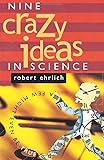Nine Crazy Ideas in Science : A Few Might Even Be True / Robert Ehrlich.
Material type: TextPublisher: Princeton, NJ : Princeton University Press, [2018]Copyright date: ©2001Description: 1 online resourceContent type:
TextPublisher: Princeton, NJ : Princeton University Press, [2018]Copyright date: ©2001Description: 1 online resourceContent type: - 9780691094953
- 9780691187839
- 500 21
- Q171.E374 2001
- online - DeGruyter
- Issued also in print.
| Item type | Current library | Call number | URL | Status | Notes | Barcode | |
|---|---|---|---|---|---|---|---|
 eBook
eBook
|
Biblioteca "Angelicum" Pont. Univ. S.Tommaso d'Aquino Nuvola online | online - DeGruyter (Browse shelf(Opens below)) | Online access | Not for loan (Accesso limitato) | Accesso per gli utenti autorizzati / Access for authorized users | (dgr)9780691187839 |
Frontmatter -- Contents -- Acknowledaments -- 1.Introduction -- 2. More Guns Means Less Crime -- 3. AIDS Is Not Caused bv HIV -- 4. Sun Exposure Is Beneficial -- 5. Low Doses of Nuclear Radiation Are Beneficial -- 6. The Solar System Has Two Suns -- 7. Oil, Coal, and Gas Have Abiogenic Origins -- 8. Time Travel Is Possible -- 9. Faster-than-Light Particles Exist -- 10. There Was No Big Bang -- 11.Epilogue -- Notes to the Chapters -- Bibliography -- Index
restricted access online access with authorization star
http://purl.org/coar/access_right/c_16ec
AIDS is not caused by HIV. Coal and oil are not fossil fuels. Radiation exposure is good for you. Distributing more guns reduces crime. These ideas make headlines, but most educated people scoff at them. Yet some of science's most important concepts-from gravity to evolution-have surfaced from the pool of crazy ideas. In fact, a good part of science is distinguishing between useful crazy ideas and those that are just plain nutty. In this book, a well-known physicist with an affinity for odd ideas applies his open mind to nine controversial propositions on topical subjects. Some, it turns out, are considerably lower on the cuckoo scale than others. Robert Ehrlich evaluates, for the general reader or student, nine seemingly far-out propositions culled from physics, biology, and social science. In the process, he demonstrates in easy-to-understand terms how to weigh an argument, judge someone's use of statistics, identify underlying assumptions, and ferret out secret agendas. His conclusions are sometimes surprising. For instance, he finds that while HIV does cause AIDS and the universe almost certainly started with a big bang, our solar system could have two suns, faster-than-light particles might exist, and time travel can't be ruled out as mere science fiction. Anyone interested in unorthodox ideas will get a kick out of this book. And, as a fun way of learning how to think like a scientist, it has enormous educational value. Of course, only time will tell whether any of these nine ideas will be the next continental drift--the now orthodox account of the Earth's geology that was for years just a crazy idea.
Issued also in print.
Mode of access: Internet via World Wide Web.
In English.
Description based on online resource; title from PDF title page (publisher's Web site, viewed 30. Aug 2021)


